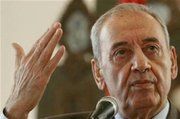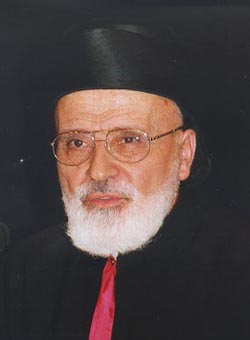
Daily Star. BKIRKI: Maronite Patriarch Nasrallah Butros Sfeir said on Monday that he hoped the 15-month-old deadlock in Lebanon would be resolved, "and the general mood of pessimism will soon evaporate." "We urge all local, regional and international groups to adopt a wise and calm attitude when dealing with Lebanese affairs," he told a delegation from the French Embassy headed by charge d’affaires Andre Parant. Parant, meanwhile, said France was determined to help Lebanon overcome the continuing standoff. "France will always stand by Lebanon," he said.
Sfeir said Sunday the persisting and widening divide had stripped Easter of its festive atmosphere. Sfeir made the remarks during his Easter sermon in Bkirki, the seat of the Maronite church north of Beirut. The patriarch also offered prayers for peace in Lebanon and the Middle East. Sfeir asked that "God remove this black cloud that lingers over us … and bring home the people who migrated to distant lands."
Speaking to a delegation from Caritas headed by Father Louis Samaha on Saturday, Sfeir said he hoped that Lebanon would return "to days of good, affluence and happiness." He added that he hoped the Lebanese diaspora would return to their homeland as one family of different religious affiliations living "in a nation of faith, love and peace." Sfeir said nearly one million Lebanese have left Lebanon since 1970, and Lebanon was left with only four million of its children, a number equivalent to a small street in Cairo or New York. "Yet people continue to migrate," he added, "and migration is not categorically negative, especially if the migration is to Arab countries in order to support one’s parents, but migration to Australia or Canada or the United States has slight hope of return to Lebanon." Meanwhile, the vice president of the Higher Shiite Council Sheikh Abdel-Amir Qabalan on Sunday spoke with Patriarch Nasrallah Sfeir and Mufti Sheikh Mohammad Rashid Qabbani about the need for Lebanon to be represented at the forthcoming Arab summit in Damascus.
Daily star. BKIRKI: Maronite Patriarch Nasrallah Butros Sfeir expressed pessimism over growing divisions among the Lebanese on Friday, a day after he compared Lebanon to the Palestinian territoriees. In a speech on Good Friday, Sfeir urged the Lebanese to "overcome disagreements and return to their conscience." "Rifts and divisions that have hit Lebanon do not lead to optimism," he said, adding that "persistent efforts [by some parties] to overtake the country’s main arteries are not comforting."
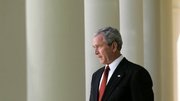 Thu Apr 17, 8:35 PM ET , WASHINGTON (AFP) – US President George W Bush on Thursday accused Iran and Syria of undermining democracy in Lebanon and renewed his support for the embattled government of Prime Minister Fuad Siniora. The United States will continue to stand with the Lebanese government and the Lebanese people as they struggle to preserve their hard-won sovereignty and independence, endeavor to provide justice for victims of terrorism and political violence, and continue to seek the election of a president committed to these principles," Bush said in a written statement.
Thu Apr 17, 8:35 PM ET , WASHINGTON (AFP) – US President George W Bush on Thursday accused Iran and Syria of undermining democracy in Lebanon and renewed his support for the embattled government of Prime Minister Fuad Siniora. The United States will continue to stand with the Lebanese government and the Lebanese people as they struggle to preserve their hard-won sovereignty and independence, endeavor to provide justice for victims of terrorism and political violence, and continue to seek the election of a president committed to these principles," Bush said in a written statement.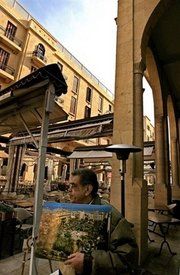 by Rita Daou, BEIRUT (AFP) – Loretta Beayni works 10 hours a day, six days a week in a Beirut beauty salon, earning a mere 400 dollars a month, which goes in the blink of an eye on household bills and helping out her parents. Like many Lebanese, she has a hard time making ends meet in a country where inflation is hefty and where many are forced to take on two jobs to survive.
by Rita Daou, BEIRUT (AFP) – Loretta Beayni works 10 hours a day, six days a week in a Beirut beauty salon, earning a mere 400 dollars a month, which goes in the blink of an eye on household bills and helping out her parents. Like many Lebanese, she has a hard time making ends meet in a country where inflation is hefty and where many are forced to take on two jobs to survive.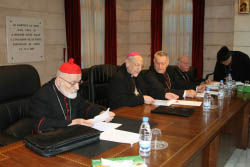 By Maroun Khoury and Nafez Qawas, BKIRKI: The Council of Maronite Bishops called on Wednesday for the immediate implementation of the Arab initiative to solve the deadlock in Lebanon, while sounding the alarm concerning "strenuous" economic conditions faced by the Lebanese. The Maronite bishops said it was unfortunate that a Lebanese president was not able to participate in the recent Arab summit, especially after the Arab League had stressed the need to elect a president in Lebanon. "We call for internal and external cooperation to implement the Arab initiative to solve Lebanon’s crisis," the bishops said after their monthly meeting in Bkirki.
By Maroun Khoury and Nafez Qawas, BKIRKI: The Council of Maronite Bishops called on Wednesday for the immediate implementation of the Arab initiative to solve the deadlock in Lebanon, while sounding the alarm concerning "strenuous" economic conditions faced by the Lebanese. The Maronite bishops said it was unfortunate that a Lebanese president was not able to participate in the recent Arab summit, especially after the Arab League had stressed the need to elect a president in Lebanon. "We call for internal and external cooperation to implement the Arab initiative to solve Lebanon’s crisis," the bishops said after their monthly meeting in Bkirki. 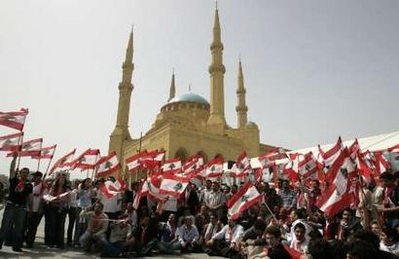 By CLAUDE SALHANI, UPI Contributing Editor, WASHINGTON, March 31 (UPI) —
By CLAUDE SALHANI, UPI Contributing Editor, WASHINGTON, March 31 (UPI) — 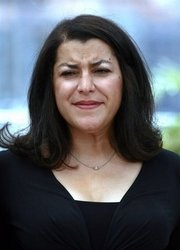 BEIRUT (AFP) – Lebanese authorities reversed on Thursday a decision to ban the prize-winning animated film "Persepolis," following an outcry and claims the measure was aimed at pleasing Iran and Shiite clerics. The general security department, which initially prohibited the film, said the ministry of interior, of which it is a part, had "decided to authorise the film’s distribution in Lebanon".
BEIRUT (AFP) – Lebanese authorities reversed on Thursday a decision to ban the prize-winning animated film "Persepolis," following an outcry and claims the measure was aimed at pleasing Iran and Shiite clerics. The general security department, which initially prohibited the film, said the ministry of interior, of which it is a part, had "decided to authorise the film’s distribution in Lebanon".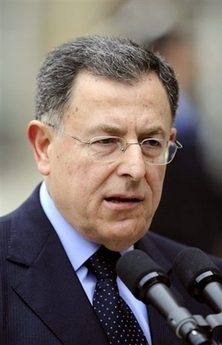 Lebanon’s prime minister accused Syria on Friday of blocking the election of a new Lebanese president and deepening the country’s 16-month political crisis through its interference in the country’s internal affairs. Fuad Saniora said Lebanon decided earlier this week to boycott this weekend’s Arab summit in the Syrian capital of Damascus because Beirut is usually represented by its president.
Lebanon’s prime minister accused Syria on Friday of blocking the election of a new Lebanese president and deepening the country’s 16-month political crisis through its interference in the country’s internal affairs. Fuad Saniora said Lebanon decided earlier this week to boycott this weekend’s Arab summit in the Syrian capital of Damascus because Beirut is usually represented by its president.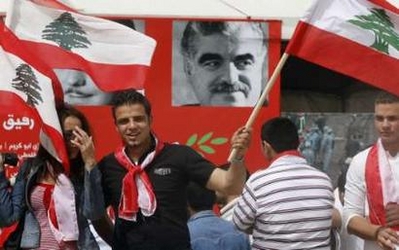 United Nations, Former Lebanese prime minister Rafik Hariri was assassinated by a criminal network that is linked to some other terrorist attacks in Lebanon, the chief investigator said Friday.\In his first report to the U.N. Security Council, Daniel Bellemare said the first priority of the investigating commission he heads is to gather more evidence about the "Hariri Network," its scope, the identity of all its participants, their role in other attacks and links with people outside the network.
United Nations, Former Lebanese prime minister Rafik Hariri was assassinated by a criminal network that is linked to some other terrorist attacks in Lebanon, the chief investigator said Friday.\In his first report to the U.N. Security Council, Daniel Bellemare said the first priority of the investigating commission he heads is to gather more evidence about the "Hariri Network," its scope, the identity of all its participants, their role in other attacks and links with people outside the network.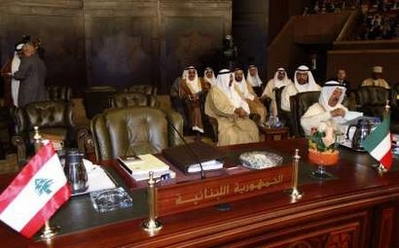 DAMASCUS (AFP) – Syrian President Bashar Al-Assad denied on Saturday meddling in Lebanon as he hosted an Arab summit boycotted by half of the region’s leaders, many of whom blame Damascus for the political crisis in Beirut. I would like to make a point with regards to Syrian interference in Lebanon. It is the contrary which is true because pressure has been exerted on Syria for over a year to interfere in Lebanon’s affairs" but we have refused to do so, Assad said.
DAMASCUS (AFP) – Syrian President Bashar Al-Assad denied on Saturday meddling in Lebanon as he hosted an Arab summit boycotted by half of the region’s leaders, many of whom blame Damascus for the political crisis in Beirut. I would like to make a point with regards to Syrian interference in Lebanon. It is the contrary which is true because pressure has been exerted on Syria for over a year to interfere in Lebanon’s affairs" but we have refused to do so, Assad said.
